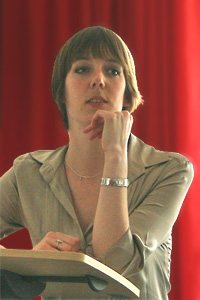
On Thursday 22 May Julia Peters, future post-doctoral fellow at ECLA, helped us to understand the notoriously difficult ideas of German philosopher G.W.F. Hegel. In a focused lecture, Peters traced Hegel’s argument for the institution of private property as a necessary condition for human freedom.
Hegel endorses the idea that institutional constraints allow for freedom – a counter-intuitive standpoint, which Peters set out to explain. More usually, subjective freedom is defined as the individual’s unconstrained and undetermined choice of action. Hegel takes this more usual conception of freedom as a starting point, stating that one is free only when one reflects on a situation and abstracts the action from the contingencies that motivate it. One is to act on the basis of reflection if one is to be free. This is somewhat problematic, as Charles Taylor (an important interpreter of Hegel) pointed out: if all actions are truly viewed in the abstract, so as to separate them from their ends,it seems impossible to choose a particular course of action. Peters explained Hegel’s solution: there is one purpose which cannot be abstracted from the potential action attached to it – that of freedom itself. To abstract the goal of freedom from its action, would be to contradict the possibility of reflection and rationality itself. As subjective freedom is an end for free action, so must be all the objective conditions that make this free action possible. Among the necessary conditions of freedom are the institutions of civil society and the state. Thus for reflection to be consistent with the freedom that facilitates it, it can drive only those actions in which the institutions that guarantee freedom are sustained. Freedom and its necessary conditions are the rights of any human being in Hegel’s view.
The second part of Peters’ lecture addressed Hegel’s ideas on property. Property is one of the institutions of civil society that Hegel lays out as objectively necessary conditions of freedom. Peters detailed the process of how private property becomes necessary for freedom in the argument of Hegel’s Philosophy of Right. Private property consists of three elements: physical possession, exclusive use of the object, and the possibility of passing it on to another owner. Physical possession also has three components: appropriation, modification and designation of the object as ‘mine’. This structure reveals the way in which Hegel relates private property to self-perception, for example: changing an object makes one’s will and desires actual and visible in the real world. It is this manifestation of one’s will that enables self-perception through the possibility of receiving the recognition of others. A system of private property allows for the mutual recognition between people that for Hegel is so crucial in achieving a sense of self. Peters ended by relating this conclusion to the first part of her lecture: private property is an objective condition for perceiving oneself as a free agent.
Julia Peters will join ECLA next year as a post-doctoral fellow. A specialist in German Idealism and Aesthetics, she is researching the connection between philosophy and art in Hegel’s philosophical system, on which she has published several articles. She studied at University College London, Johns Hopkins University and Oxford University and is the co-founder of the London Aesthetics Forum. She is the recipient of a Jacobsen Fellowship from the Royal Institute of Philosophy.
by Martin Lipman (’08, Netherlands)
